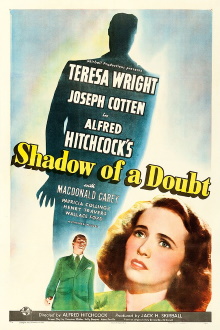This is a lesser Alfred Hitchcock film that I added to my list originally because the director mentioned in various interviews that it is one of his favorites. I think this was probably because it is one of his earliest Hollywood films that was a great success and clearly establishes his signature style. Watching this now, it feels too straightforward to be truly great but there are perhaps some interesting insights to be had in its themes.
Charlotte Newton lives in Santa Rosa, California with her family and despite being relatively well-off and free of worries, feels bored and aimless. She cheers up however when her uncle, the younger brother of her mother, Charles Oakley arrives for a visit. Her mother and him shared a close relationship while growing up and Charlotte herself feels a special kinship with him. He showers the family with gifts when he arrives, including an expensive ring for Charlotte, and deposits a large amount of money in the bank where her father works. But it is clear that Charles is actually fleeing trouble. Two men are tailing him everywhere that he goes and introduce themselves as interviewers who are doing surveys of typical American families to ask them questions. Charles however avoids them and refuses to have his photograph taken. One of them in particular, Jack Graham, actually starts dating Charlotte who in turn realizes that they are detectives and that they suspect Charles of committing some horrible crime.
This is a rather strange film. As my wife notes, it is completely focused on the tension of Charlotte slowly coming to realize that her beloved uncle is indeed evil and is later torn over revealing that fact to the rest of her family in order to spare their feelings. It does this to the exclusion of everything else, including any sense of mystery or ambiguity over Charlie’s guilt or indeed any realism whatsoever. Police in the United States do not pretend to be pollsters to justify asking questions and certainly do not go to such extraordinary lengths to avoid hurting a family’s feelings. Suspects do not get to duck interviews with the police and it is flabbergasting that Charlie has not been immediately arrested given the seriousness of the crimes he has been accused of and that they are violent in nature. From a Doylist perspective, we understand why of course. This story would only work if the investigation remained low-key so that life in the family goes on as usual with Charlotte being the only person who knows what is really going on. But it’s hard to take the entire scenario seriously given how unrealistic the whole thing.
While there is some value in watching Charlotte come to realize that Charlie isn’t who he appears to be, her character is actually intelligent enough at putting the clues together that the process doesn’t take very long at all. I believe that the real horror here isn’t that people like Charlie exist. Instead, the horror that Hitchcock intends to convey in this film is that people like Charlotte exist, who know of monsters like Charlie, but choose to let them be in order to preserve the idyll that everyone around her enjoy and indeed depend on. She is so fearful of upsetting her mother that she seems to allow what she knows are attempts to murder her to pass without mention, which seems like a rather extreme reaction. I suspect that Hitchcock is also making a point about critiquing sheep like Charlotte’s mother whose peace of mind and happiness relies in willfully closing their eyes to the darkness that exists in society. It is amusing how Charlotte’s father and his friend play at being detectives in the background, thinking of ways to commit the perfect murder, as a sort of fun, intellectual game without ever realizing the truth about Charlie.
In the end, as interesting as this seed of an idea is, this isn’t the film that really pulls it off well. Charlotte is just too naïve and pure a character to truly take a step into the darkness that Hitchcock wants to explore. It would be so much better if another character, the older police officer for example, calls her out for being so hesitant about condemning her uncle. Instead the film gives her a happy ending that she doesn’t really deserve at all.
